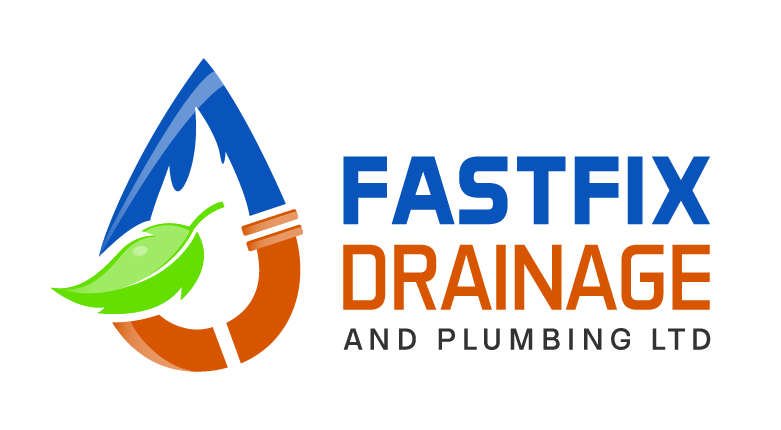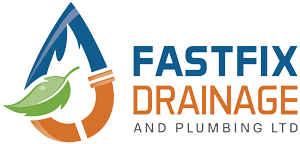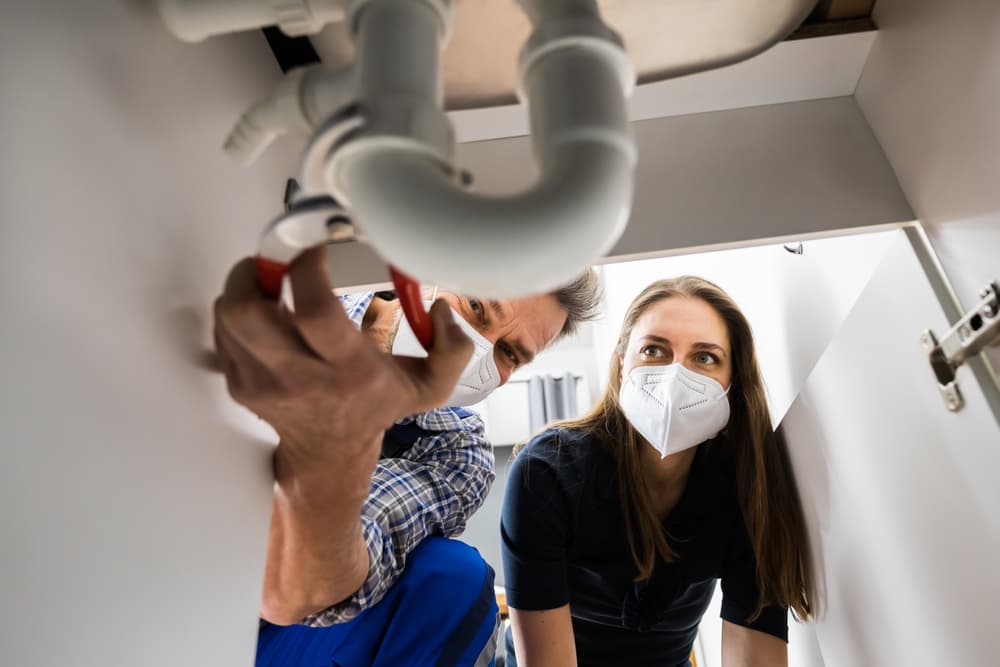What are the most common causes of clogged drains?
Clogged drains are one of the most common drainage issues in properties up and down the country. When your drain gets clogged it causes a blockage that needs to be fixed in order to ensure sufficient drainage so that the system can work as it should be.
Whether your toilet, kitchen sink, bathtub, shower, bathroom sink or laundry pipes have been blocked, it can cause major disruption to your lifestyle. Blocked drains can be a significant inconvenience that ultimately leads to having to call out a plumbing expert who will be able to identify and amend the clogged drain.
However, what if there was a way to prevent this common issue so you didn’t have to go through the inconvenience of clogged drains? Therefore, you could avoid all the time and money that you have to spend trying to fix the issue, alongside the problems of having to get your drains unblocked.
Luckily for you, as a leading drainage repairs company we have come across our fair share of clogged drains over the years and can easily identify the most common causes of clogged drains.
Throughout this article, we will provide you with details of the common culprits for blockages that we typically see on a day-to-day basis and how you can mitigate the risk to be able to prevent clogged drains from occurring in your property.
7 most common reasons for blocked drain pipes
Although drainage blockages can be a major inconvenience to your home and lifestyle, fortunately, there are some common outliers that cause blockages. Throughout this article, we will provide you with a few simple precautions and maintenance tips, that you can look to avoid and prevent clogged drains as well as document the most common issues that can cause a blocked pipe.
The following common reasons for blocked drain pipes include:
- Food Scraps
- Grease, Fats & Oils
- Soap & Hair
- Third-Party Damage
- Mineral Buildup
- Tree Roots
- Displaced Pipework
1. Food Scraps
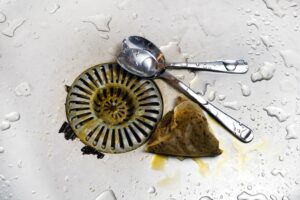
Food scrap and food waste are one of the biggest culprits for blockages within the kitchen sink drainage system. Even if you do have garbage disposal built into your kitchen sink, food waste can still block up your pipes and cause a clog.
Never put large amounts of food down your sink even if you have a garbage disposal installed within your sink. Foods such as egg shells, pasta, rice, coffee granules and tea leaves are particularly bad because they don’t break down causing blockages.
If your sink is blocked due to food residue and waste, it is worth getting in contact with a local plumbing expert who will be able to amend the issue for you.
In order to prevent this issue from occurring, ensure that no food waste or scraps are placed down the sink and instead are deposited within a compost, food disposal bin or your general rubbish bin depending on your local council regulations. When dealing with a food waste disposal system, never put large amounts of food down it and ensure that it is regularly cleaned.
2. Grease, Fats & Oils
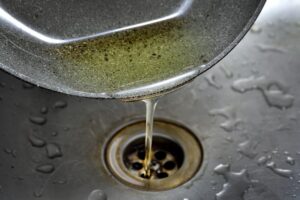
Another typical culprit that causes kitchen sink drains to clog is fats, oils and grease. Most people after cooking often simply throw cooking oils, grease and fats down the sink rather than disposing of them correctly.
These cooking leftovers over time begin to build up within your kitchen sink pipes coating the walls and combining with other debris to cause large blockages within your sink.
As a way to prevent this issue, ensure that you are not disposing of cooking byproducts down the sink and instead dispose of them correctly by collecting the residue in a glass jar or can and then placing it in your rubbish bin.
3. Soap & Hair
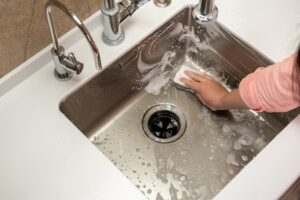
Soap and hair residue can cause blockages within your drainage system and is typically the culprit of a blockage that is associated with your laundry, bath, shower and bathroom sink drains. The combination of both soap scum, which is a residue that soap leaves behind, and large clumps of hair being stuck together can create a large blockage that will need to be fixed by a qualified plumber.
As a way to mitigate and prevent blockages try to use soap-free washes when possible to avoid the build-up of excess soap scum. Another easy way to avoid hair blockages is by ensuring that you dry your hair, outside of your bath or shower tub so that no hair strains fall as residue.
4. Third-Party Damage
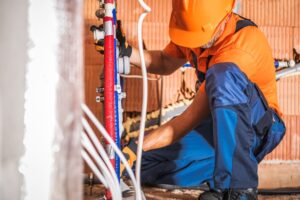
Third-party damage is also another culprit that can result in the build-up of debris within your drains causing a blockage. Third-party factors such as construction activities taking place in your house, accidental damage such as mishaps near your drainage system and improper disposal of waste can all contribute to blockages of your drainage system.
In order to avoid third-party damage, it can be wise to point out your drainage system to anyone that is working nearby to it. Furthermore, it is wise to regularly inspect your drainage system to ensure that there is no sudden blockage or build-up that has occurred after construction work has taken place.
5. Mineral Buildup
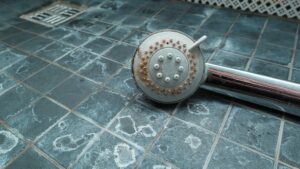
Hard water can cause your drain to become blocked up with mineral deposits. Hard water is water that has a high mineral count that includes calcium, magnesium and sulfates that eventually build up and deposit within your drainage systems.
A way to reduce the risk of this problem is by installing a water softener system that will remove the risk of hard water and the build-up of minerals within your home’s drainage system.
6. Tree Roots
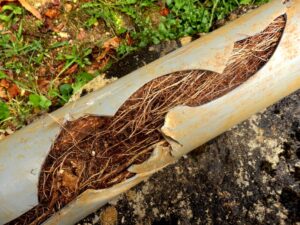
Tree roots and external natural issues can cause blockages to your drain system. Even the smallest of cracks in your pipes can unfortunately lead to an infestation of tree roots or natural elements that get into the pipes.
Once these natural elements have breached your drainage system, they can continue to grow and begin to cause damage and obstruct water flow within your drain. This ultimately leads to blockages.
As tree roots, plants and leaves can all cause major damage and issues, it can be a fairly complicated issue to solve. Therefore, it is best practice that you get into contact with a drains repair expert who will be able to diagnose and amend the issue at hand.
As a way to mitigate damage from natural sources, it is wise to be aware of where your drainage system is located and whether that is in correlation with any vegetation such as trees or plants. If so it is important to review the state of your drains regularly to ensure there has been no further damage due to tree or plant roots a such.
7. Displaced Pipework
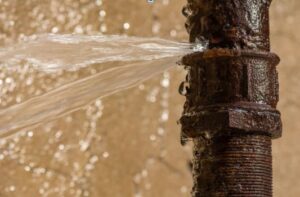
Displaced pipework is a typical cause of blocked drains for properties that have older drainage systems that are on the decline. Over the years, things can happen that cause the old pipes to shift and become displaced. These older styles of plumbing pipes are made in three-foot sections and built out of concrete and clay.
Their old design makes them prone to being pushed upwards and displaced. They are typically moved upwards which affects the flow of your sewage system so it cannot flow efficiently from your home drains to the external sewer system.
This is a major issue that will require a qualified plumbing and drainage repair expert who will have to diagnose the issue at hand and offer advice on the next best steps. Typically this can involve excavation and major rehaul to your property’s plumbing system.
What is the best way to prevent a clogged drain?
Overall, the best way to prevent a clogged drain within your property is by ensuring that you are proactive and keeping on top of things. It is essential that you keep your drains in good working condition otherwise a clog will occur.
If you start to notice a clog forming over time and your drains begin to empty slower than usual or not at all, it is a good indication that a clog is beginning to form in your pipes. Slow-moving drains and foul odours emerging from your drainage system are good indications that a clog is building up within your drainage system.
If you do notice any of the following symptoms, it is worth getting in contact with a local plumbing expert as soon as possible because clogs seem to worsen over time. If you require support in unblocking your drains in the Bristol area, look no further than Fastfix Drainage and Plumbing Limited which offer high-quality and reputable local drainage and plumbing repairs ranging from an array of commercial and domestic property projects.
